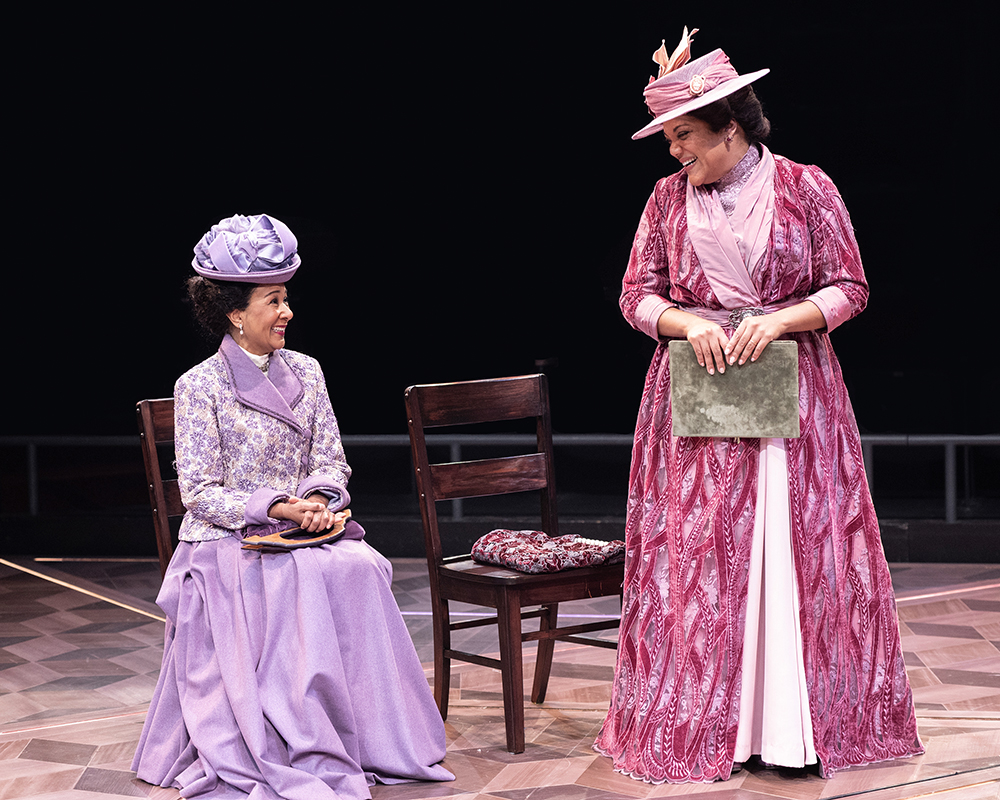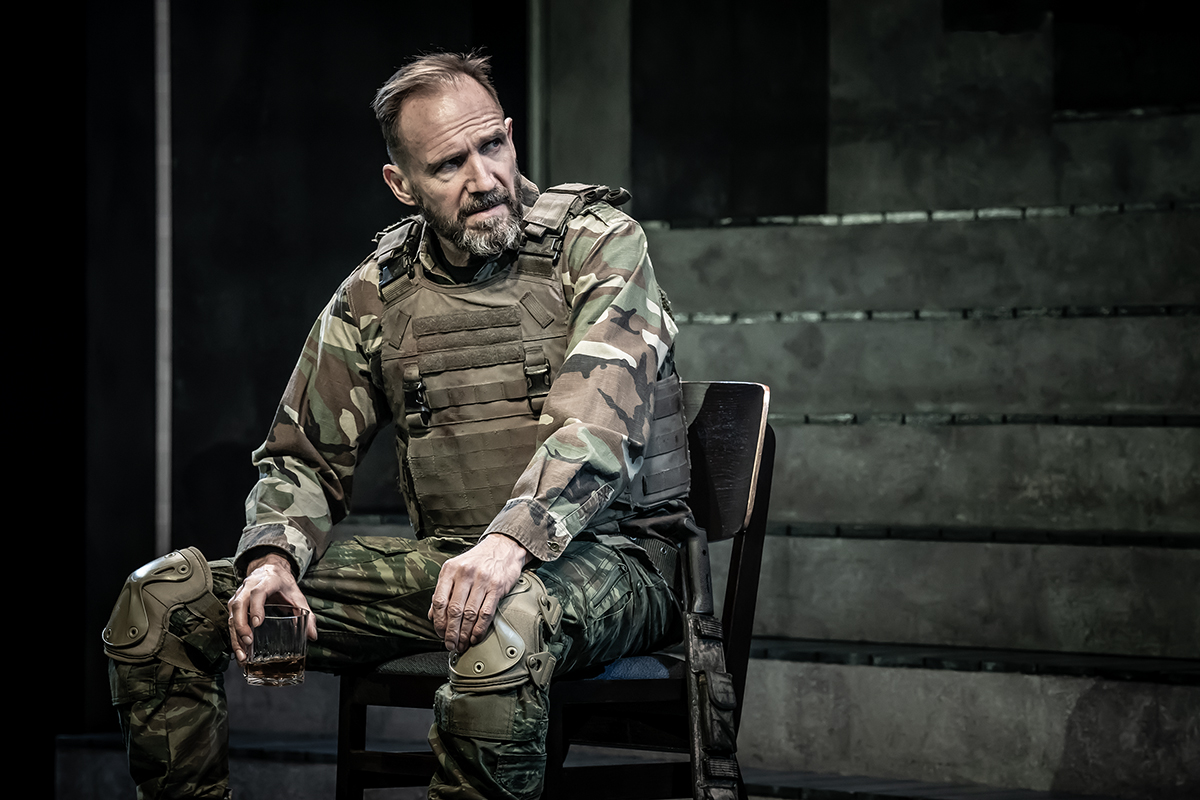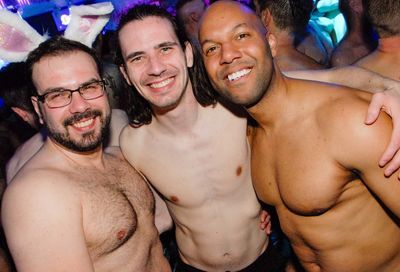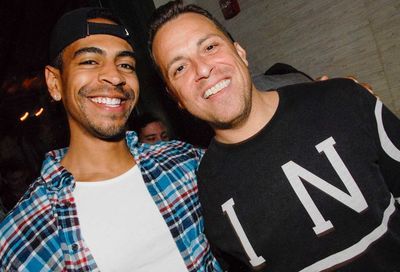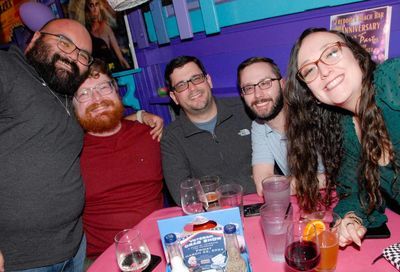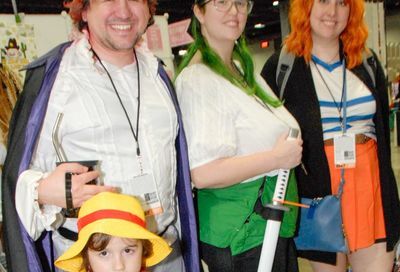Storied Lives
Playwright Moises Kaufman of The Laramie Project listens to voices of the living and the lost to tell stories of ourselves and lessons for our future
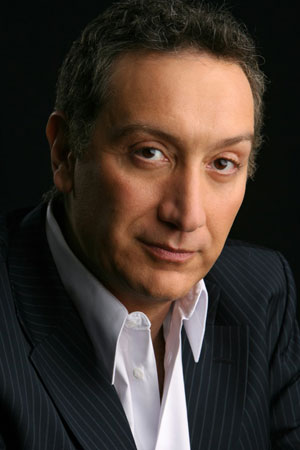
Moises Kaufman
Moises Kaufman enjoys telling stories. He especially enjoys telling stories about how we tell stories. The Venezuelan-born, gay playwright and director says narrative serves a ”very primal purpose in our life.”
Whether they are historical, collective or individual, Kaufman has spent the past 15 years exploring stories, writing about them, interpreting them. He is at ease in the distant past, where sexuality was hidden by all but the most extreme of individuals. And he has made a place in the present, exploring a town and its understanding of its own dark side. And yet, he holds out hope for the future, believing that a story a child hears today could give him hope for a life that may be 10 years from being achieved.
Kaufman has told the story of how Victorian England told its story of sexuality during the trial of Oscar Wilde. He called it Gross Indecency: The Three Trials of Oscar Wilde and won critical acclaim for the show in 1997.
Six years later, he directed the story, written by Doug Wright, of how Charlotte von Mahlsdorf – born Lothar Berfelde – told her story of oppression and repression from Nazis and Communists. The play, I Am My Own Wife, went on to win the 2004 Pulitzer Prize for Drama and the Tony Award for Best Play, and merited the first of two Tony Award nominations for Kaufman, this one for directing.
But it was, in its way, a simple story – an Our Town for the new millennium – that became his most well-known work, due in large part to the currency of the subject matter but also likely because of the HBO movie that resulted from it. The Laramie Project, Kaufman’s play about the response of the town where Matthew Shepard was murdered, is meticulous in its detail, because Kaufman and his company – the Tectonic Theater Project – went to Laramie, Wyo., to interview and record the aftermath of Shepard’s killing in October 1998 as it was happening.
Arena Stage is mounting The Laramie Project and The Laramie Project: 10 Years Later this weekend – his original play and the follow-up looking at Laramie in 2008. The performances, which run five hours combined, directly deal with questions about the way gay lives are lived in America – and fall two weeks after the midterm elections that saw LGBT issues front and center and during a time when LGBT suicide has been in the national spotlight.
Kaufman, who turns 47 on Sunday, has strong words about voices of hate – and criticism for what he views as ”problematic” responses to hate. That said, from Judy Shepard to the “It Gets Better” project, Kaufman also sees many voices today that, as he puts it, can serve as an ”antidote” to anti-LGBT bullying.
So, Moises Kaufman — who next will be mounting a production of his play 33 Variations in L.A. with Jane Fonda and opening Bengal Tiger at the Baghdad Zoo with Robin Williams on Broadway — will go on telling stories.
And we will go on reading and watching. And maybe even listening.
METRO WEEKLY: Why write The Laramie Project: 10 Years Later? Why did you want to revisit the site of Matthew Shepard’s 1998 murder?
MOISES KAUFMAN: When the 10th anniversary was coming up, I realized that there was a curiosity on my part – I got very curious about what Laramie looked like 10 years on after the crime. When we were there the first time, we encountered a town that was very, very, very hurt – and in shock, and in turmoil because of this murder that had happened in their midst. I often say, I live on the Upper West Side of Manhattan. If there is a murder that happens a block away from my house, I think, “Well, this is New York, that’s it.” In Laramie, because it was such a small town of 26,000 people, people there were forced to ask themselves, “Why are we making a community here where this kind of thing happens?” And they asked themselves, “Why are we raising children like that here?”
So, there was a real soul-searching that went on during our time there, and I think that the reason why I wanted to go back was because I wanted to see how Laramie looked 10 years after that even. I wanted to know: What does an American town look like 10 years after a murder of that magnitude occurs in its heart?
MW: Now that you’ve gone back, you have that additional part, how do you feel that changes the performance?
KAUFMAN: The first thing we realized when we went back to Laramie was that perhaps the question that we were posing was not terribly helpful. ”How has Laramie changed?” is not a great question. Perhaps the question is, ”How do we measure change?”
Do we measure it by the fact that now there is an AIDSWalk that goes right down the main street of Laramie and that raises thousands of dollars every year for AIDS? That it ends with a drag show at the cowboy bar? To me, in a town like that, that definitely is progress.
There is a social symposium – a university symposium for social justice now called the Shepard Symposium for Social Justice. Every year, thousands of students from all over Wyoming come to Laramie to attend this symposium, and they hear civil rights speakers and social justice speakers speak. So, that is obviously some change.
The nature of the dialogue, we felt, had changed. Those were some markers that were clear and quantifiable.
Perhaps something that wasn’t so quantifiable was the fact that we started hearing quite a number of people that were saying that Matthew Shepard’s murder wasn’t a hate crime. And they started saying that Matthew Shepard’s murder was a drug deal gone bad, or a robbery gone bad. We found that there was a real attempt on the part of many people in the town to rewrite history, and to rewrite the narrative of the murder. And, unfortunately, there weren’t only a few people who were saying that. It was a pretty – in our opinion – prevalent view.
Now, of course, there are many people in Laramie who say, ”No, absolutely, it was a hate crime. And it was because Matthew was gay, and we have to own this.”
So, that dialogue within the community – of ”How are we going to tell this story? How are we going to recount this narrative? How are we going to create our identity? How are we going to tell of our identity?” – those are really the questions that the second part of Laramie deals with.
The play is not only about the event of Matthew Shepard and how the town of Laramie responded to the event any more. Now, it’s about how a town constructs its own identity and how a town constructs its own narratives – and how we, as individuals, and as communities, deal with the narratives that define us.
MW: The Laramie Project obviously took you to a place where far less time had passed since the incident that you were writing about and your interviews and writing process began. How do you see this process of gauging history as it happens different from looking back 100 years earlier at the trial of Oscar Wilde, as you did in your earlier play, Gross Indecency?
KAUFMAN: I think that Gross Indecency really inspired me to write The Laramie Project because, when I read the transcripts of the trial, I found in them a document that was a sort of X-ray of Victorian society. It was a document that spoke of how Victorians felt about sexuality, about sexual orientation – but not just about those things, but also about class, about religion, about education, about meaning and about identity.
Even though they were trying Oscar Wilde, in the transcripts of the trial you hear Victorian men and women speak of what they held dear to their heart. In those texts, you understand what were the ideological pillars of that culture at that time.
My desire to go to Laramie was in a large part nurtured by this curiosity: Can we talk to the people of the town and gather a document that would operate like the transcripts of Oscar Wilde’s trial – a document that would, in fact, record not only how the people of Laramie felt about sexuality, sexual orientation and hate – but how they felt about class, how they felt about identity, how they felt about education, how they felt about violence, how they felt about what we’re teaching our children?
MW: The efforts you saw in Laramie – whether conscious or subconscious – to rewrite that narrative: What was your response as somebody who had come to Laramie back when the narrative was more raw, as opposed to the way that people were talking about things 10 years later? How did you view that as a playwright?
KAUFMAN: That idea, that desire to construct an identity, is a very profound desire for all of us as human beings. When somebody asks you where are you from? ”Well, I’m from Arkansas, and I came to New York when I was 12, and I started….”
Narratives serve a very, very, very primal purpose in our life. Laramie’s desire to re-write the narrative had as much to do with the fact that, fortunately or unfortunately, this crime had given the town such a bad reputation. Many people in Laramie said to us, ”Well, we’ve sort of become the hate crime capital of America.” You say “Laramie,” and it is equivalent – for many people – with hate crime.
I think that when something like that happens, that not only affects an entire community because of the event and the brutality and the fear the event generates, but because of the aftermath, which is an aftermath that redefines your identity. And many people in Laramie feel, ”No, we’re not the hate crime capital of America. No, this is not what we’re like.” There is a profound desire to reconstruct your identity and reconstruct your sense of self.
MW: Matthew Shepard’s murder, outside of Laramie, also served to reconstruct the identity of a lot of gay people. It was a stark reminder of the dangers that were still out there –
KAUFMAN: That we all face.
MW: Yes, and, for the people who were constructing their own identity at that time, that murder became a part of their identity because it was a shared experience that people faced. When you create theater around this, that’s also based in fact, how do you think that helps outside of Laramie at creating the narrative that we all live with?
KAUFMAN: Well, there is a way in which people felt and feel that Matthew Shepard’s murder was a defining moment in our history – in our history as Americans, in our history as gay people, in our history as people who are in the middle of a social justice fight, and some would say, in the middle of a social justice war. And Matthew Shepard was one of the great casualties of that war.
One of the things that theater can do is provide narratives that bring us together. Theater can provide narratives that show us what the kind of iconic events of our history are. When we go to the theater, we see the re-creation of how a historical event felt – as you say, we all feel that this could happen to all of us. And, also, The Laramie Project tells the story of an American town dealing with issues that we as gay people have to deal with every day. So, there’s something very cathartic about feeling that you’re part of a national dialogue, feeling that you’re part of a discussion that is happening on a national level.
I always say that there are many reasons why the Matthew Shepard murder became that kind of watershed historical moment. There are over 1,000 anti-gay crimes in America every year that are reported. That means there are probably another 500 that are not reported because people are in the closet and just don’t report it. But for some reason, this one resonated. This crime was the one that we as a nation came together and said, “Look at what’s happening.” It operated as a lightning rod in our culture. When something like that happens, you have to ask, “Why? Why this one? Why Matthew Shepard?”
And you know, there are many answers. Partially, it’s the symbolic nature of the crime. It was a crucifixion, and you cannot do that in this culture without creating an incredible amount of attention.
The other reason was because he was white and he was photogenic. A Latino drag queen who is killed – goes home with someone, is tied to the bed and murdered – is not a worthy victim in our culture the way Matthew Shepard was.
So, I think that there’s those reasons. But there’s another reason that is a very positive reason: We, as a culture, were finally able to hear it. I profoundly believe that had Matthew Shepard been killed the way he was killed 10 years before – in 1988 as opposed to 1998 – we would have never heard of it. So, I think the fact that we as a culture are somewhere where we can actually have this conversation is something that the theater can reflect – because that’s what we do in the theater, we have conversations.
I think that, unbeknownst to him, Matthew Shepard went on to become a narrative that resonated with many of us.
MW: It resonated to the point that, a little more than a year ago, the president signed into law the Matthew Shepard and James Byrd Jr. Hate Crimes Prevention Act, which obviously is a level of narrative that most stories don’t reach.
KAUFMAN: I think that you’re absolutely right. It is in no small part – there’s a reason why the act is called the Matthew Shepard and James Byrd Act. These were two particular moments in our history.
The Tectonic Theater Project was able to go to the White House when it was signed. In a way, it was partially because we had been following this narrative so long that we needed to be at the White House when it was being signed. It took 10 years to get that legislation passed [after Shepard’s murder]. And it was in no small part due to the efforts of Judy Shepard.
MW: What has your experience been with Judy Shepard? Obviously, she’s been a strong source of that narrative that resulted from her son’s murder.
KAUFMAN: My experience with Judy has been that of witnessing an activist being born. As she herself says, she was a mom. And because she was thrown into this position, she had two options: She could demand her privacy and go home and keep this a personal catastrophe for herself, or she could take arms and own the spotlight that was shone unwilling on her.
And she owned it. She became a spokesperson. She trained herself to be able to speak publicly and to speak from her heart. And it has been really inspiring and magnificent witnessing the transformation from a very private person into a very public figure that speaks so eloquently and beautifully about social justice and issues of equality and identity.
For many years, she didn’t see the play, she wasn’t able to see the play – and I completely understood. And, then, she finally saw the play. And, then, we made the movie, and she came to see the movie. And, since then, she’s become an ally to Tectonic Theater Project. And, many places where they do The Laramie Project, they invite her to come speak. So it’s really proved, for the Matthew Shepard Foundation and for her, a very helpful tool, which is very encouraging.
MW: When you talk about the importance and creation of narrative, The Laramie Project and, as you said, ”the birth of an activist” of Judy Shepard almost seem intertwined as narratives at this point.
KAUFMAN: I think so. Look, I want to be very clear, I’m not saying that because of The Laramie Project, she became an activist – she became an activist because this was a woman who underwent to take on the transformation, and she made decisions at each step of the way that, as difficult as they were, were noble. She would fight me on that – she would not allow me to call her noble, but I think there’s nobility in Judy Shepard.
But, I do think that definitely The Laramie Project provided an extra forum where she could continue to have the conversation.
MW: Obviously, the political narrative of change is one that is front and center as LGBT advocates look at the possibilities for change after the midterm elections, and you’re bringing a show to Arena Stage that really puts one of the key parts of that narrative front and center. How do you bring a show like yours to a city like this?
KAUFMAN: Bringing the play to Washington is very moving to me. I think that there is something important to think about, which is that, yes, political change and legislative change occur. But, before political and legislative change occur, the hearts and minds of people have to change. Matthew Shepard being murdered, and then that creating – I’m not going to say creating a movement because the movement already existed, but it articulated something for the movement that was happening at the time, was something that definitely contributed to legislative change.
There are events in our culture that galvanize us, that bring us together as a culture, that bring us together and that allow us to create a societal narrative. And I think that Matthew Shepard was definitely an event that allowed us to create a societal narrative, where we all came together and said, ‘Yes, this is what’s it’s like, this is what it’s like to be gay in America. This thing can happen to you.’
And, to Laramie’s credit, something like that happened in New York state last month, where a man was taken to an apartment and brutalized and raped – because he was gay. It was in New York. There have been hate crimes all over the nation. Matthew Shepard’s resonated, and I think there’s a way in which Laramie, Wyo., is right in feeling, ”Why do we have this reputation, as this happens in many other places?” That is a very valid discourse.
What I find problematic is: What do you do as a response to that discourse? And I think that trying to change the narrative may not perhaps be the most ethical thing to do with that.
MW: That’s a subtle way to put it. Looking at your other work, you have dealt with Oscar Wilde in Gross Indecency and Charlotte von Mahlsdorf in I Am My Own Wife – people who were outsiders, but they reveled in that. Matthew Shepard – the narrative of Matthew Shepard – was almost the opposite of that, though – wanting to be a part of, as opposed to an outsider in his community. When you’re looking at those works – all Tectonic Theater Project works that you directed – how do you see them?
KAUFMAN: The reason why the play is called The Laramie Project and not The Matthew Shepard Project is because I was really, really interested in how the people of Laramie were responding, about the historical event that happened as a result of the murder.
But, I think there is a way in which – I didn’t set out to write a trilogy, and, as you know, Doug Wright wrote I Am My Own Wife – but I think that the recurring theme with all of them is that I am profoundly fascinated by how we construct narrative, and I am profoundly interested in how theater can participate in a sort of national construction of narrative. And, I think that in that sense – that perhaps is the link or the glue between all of those works.
It’s a profound curiosity and interest in theater and in what theater is capable of doing, what theater is capable of generating, and what role theater can play on a national level.
MW: Recently, a lot of public attention has been focused on LGBT suicides. Having looked at the way that hate played into Matthew Shepard’s murder, you must have thought about the way hate plays into these suicides.
KAUFMAN: I have been incredibly dismayed by the suicides. Not surprised, but dismayed. We live in a culture in which a lot of the discourse is incredibly homophobic. Every time that you go to a church or a synagogue and the rabbi or the priest or the minister says, ”Homosexuality is a sin,” you are contributing to creating a society in which children feel like they need to kill themselves. Every time people talk about the ”sanctity of marriage,” they are creating a society in which gay and lesbian children feel the need to kill themselves. I think that that discourse is murderous. I feel that that discourse needs to be called out for what it is.
The thing that people have to remember is that other minorities are born into homes of minorities, so that if you’re Jewish you’re born into a Jewish home, if you’re African-American you’re born into an African-American home. The GLBT kids are born into homes that are usually not GLBT, and that creates an incredible sense of isolation and loneliness – and that makes them much more vulnerable to virulent discourses.
Children hear what we say. When children are bullying their gay and lesbian brothers and sisters, they’ve learned it somewhere – we’ve taught them.
So, on the one hand, we have to rejoice and we have to be happy that the hate crimes legislation passed, and, on the other hand, we have to not lose track that there’s still an incredible backlash going on in our culture against our community. That backlash takes the form of acceptable discourse, and that that acceptable discourse finds very virulent and vicious ways of penetrating the zeitgeist.
MW: You’ve talked so much about the importance of narrative, and one of the things that I’ve found most interesting about the “It Gets Better” project started by Dan Savage is the fact that it’s actually – initially – LGBT people directly attempting to influence what that narrative is. It seems like incredible power to influence the narrative that wasn’t available in the past.
KAUFMAN: Absolutely, I think that it is a fantastic, fantastic experiment in changing the narrative. It’s going to take years before we realize whether the “It Gets Better” campaign really helped, but it is a fantastic experiment in some kind of intergenerational dialogue that has never really occurred that way.
I always say that, as gay people, we have three histories – the history of the community that includes Oscar Wilde and Walt Whitman and Proust and all of the gay and lesbian people who came before us. There’s also a personal story, which is that you can go to anybody in the world, and say, “What was it like coming out for you?”
This idea – that there is a coming-out story – occurs in a personal realm, but it is a personal realm that we all share. So, there is a community history [and an individual history], but there’s also a personal history that we all share. And I think that the “It Gets Better” campaign operates exactly in that space. What it does is allow children to see themselves 10, 20 years from now.
That’s what has been really inspiring to me. The workers at Google did their video, the workers at Gap did their video, the people from the Broadway community did their video – so that, hopefully, we’re reaching many children with many varied interests. So that children who are interested in computers or the Internet, they can find in the workers of Google some nourishment and some support. And people who are interested in theater can look at the Broadway community and see some support there, and we hopefully will be serving as an antidote to the kind of bullying that’s going on.
When I was growing up in Venezuela, I didn’t know that there were any other gay people. I didn’t know that anybody else went through what I was going through – that thought never crossed my mind. I thought I was the only person in the world going through this. So, the more that we go into the different professions, communities – the more that we try to reach children everywhere we can, the more we’ll be saving lives.
The Laramie Project and The Laramie Project: 10 Years Later run Nov. 19-21 at Arena Stage. A community forum with Moises Kaufman and members of Tectonic, moderated by Sean Bugg of Metro Weekly, will be held Saturday, Nov. 20, at 5 p.m. between the matinee and evening presentations of the plays in the Kreeger Theatre. For tickets, call 202-488-3300 or visit arenastage.org. The community forum is open to the public.
Support Metro Weekly’s Journalism
These are challenging times for news organizations. And yet it’s crucial we stay active and provide vital resources and information to both our local readers and the world. So won’t you please take a moment and consider supporting Metro Weekly with a membership? For as little as $5 a month, you can help ensure Metro Weekly magazine and MetroWeekly.com remain free, viable resources as we provide the best, most diverse, culturally-resonant LGBTQ coverage in both the D.C. region and around the world. Memberships come with exclusive perks and discounts, your own personal digital delivery of each week’s magazine (and an archive), access to our Member's Lounge when it launches this fall, and exclusive members-only items like Metro Weekly Membership Mugs and Tote Bags! Check out all our membership levels here and please join us today!




